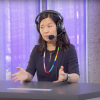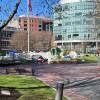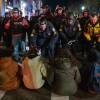Mayor Michelle Wu directly engaged with protestors at her eighteenth and final “coffee hour” gathering Wednesday in a Dorchester park, defending her handling of pro-Palestine encampments and other police conduct.
Wu has used the coffee hour events to meet directly with constituents in neighborhoods around the city to hear their concerns and interests.
“She needs to be held accountable. She lied to us,” said Khalil Howe, a 26-year old activist with the Muslim Justice League, a local nonprofit that has voiced opposition to Wu’s actions at each neighborhood coffee hour. “A lot of people endorsed her and a lot of people fought for her, and her politics changed as soon as she became the mayor.”
As Wu spoke to the crowd, Howe stood next to her podium holding an oversized “certificate of achievement” awarding Wu the “biggest disappointment ever” for “breaking promises about everything – housing, participatory budgeting, youth jobs, and prioritizing community investments over police.”
Howe and a small group of activists from the Muslim Justice League and the Youth Jobs and Power Union criticized Wu for vetoing the City Council’s proposal to reallocate $4.5 million from the city’s police and fire departments into youth job programs, rental subsidies and community land trusts.
“I did scale back the amendments that the City Council had proposed in order to not have cuts to other departments,” Wu told GBH News Wednesday. “We had already significantly increased housing and youth jobs in the original budget compared to last year. We feel confident with the resources that are in that budget and the plans that departments have to use those resources as well.”
Wu opted for an additional $750,000 increase for youth employment – out of the $2 million proposed by the Council – and $500,000 for housing. She also proposed a $69.3 million increase for the police budget, after settling contracts with two police unions last year.
“She ran on a bunch of progressive policies that she has now completely abandoned or reversed,” Howe said. “There’s just really deep frustration across the board with her policing policies.”
Wu defended the police contracts during discussions with protesters Wednesday, highlighting unprecedented reforms aimed at holding officers accountable for misconduct.
“I’m actually very proud of the progress,” Wu said. “There’s no other city in the country that agreed to a police contract with the scale of reforms that our department themselves voted to implement.”
Wu was confronted by Alec MacLean, 25, who said Boston Police Department officers choked him with his kaffiyeh during a clearing of a pro-Palestine encampment at Emerson College in April.
“Is strangling people in compliance with your expectations for police officers in the city of Boston?” MacLean asked Wu.
“No,” she responded. “Absolutely not…. I have seen footage from different angles where it shows that officers really tried to de-escalate for multiple days, including right before, and there were multiple ways for people to exit the area who did not want to be involved at all in the interaction.”
“I understand civil disobedience, but it’s a choice to try to provoke...” the mayor said before being cut off by a protester. After this story was published, the mayor’s office reached out to clarify that Wu was attempting to say that civil disobedience is intended to provoke public debate, not that protesters chose to provoke the police.
More Local News
Peace activists have called on Wu to ban the Boston Police Department from participating in an annual training seminar in Israel, which teaches techniques used by the Israeli National Police. Boston Police officers have not participated in the program since 2018, and the Anti-Defamation League, which runs the trainings, paused the trips in 2019.
“It’s unclear if the ADL is going to start them again or if other people will start them again – obviously the Israeli military is busy massacring Palestinians at the moment,” Muslim Justice League executive director Fatema Ahmad said. “But while they’ve paused the trainings, the city has refused to actually ban them from participating, whereas other cities have pulled out.”
Wu told GBH News she has “no plans” to re-engage the Boston Police Department with the Israeli training program, choosing to take a hands-off approach as opposed to an outright ban.
“No matter what experiences our officers have in different cities or in different locations, they are subject to the expectations and policies and standards of the Boston Police Department,” she said. “So no matter where they would be going to learn and bring back different insights when they come home, we have our own rules. That is what we hold our officers to.”
Between conversations with activists, Wu met with other constituents to hear neighborhood-specific concerns, including traffic enforcement issues, recycling and trash management issues.
“It’s a whole gamut of issues,” Wu said, describing the neighborhood coffee hour series as a “whirlwind of getting to experience every neighborhood coming together.”









